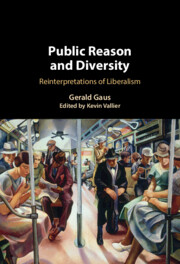Book contents
- Public Reason and Diversity
- Public Reason and Diversity
- Copyright page
- Contents
- Figures
- Tables
- A Note on the Essays
- Introduction
- Part I Liberalism
- Part II Diverse Public Reason
- Chapter 6 A Tale of Two Sets
- Chapter 7 Self-Organizing Moral Systems
- Chapter 8 Political Philosophy as the Study of Complex Normative Systems
- Index
- References
Chapter 7 - Self-Organizing Moral Systems
Beyond Social Contract Theory
from Part II - Diverse Public Reason
Published online by Cambridge University Press: 18 October 2022
- Public Reason and Diversity
- Public Reason and Diversity
- Copyright page
- Contents
- Figures
- Tables
- A Note on the Essays
- Introduction
- Part I Liberalism
- Part II Diverse Public Reason
- Chapter 6 A Tale of Two Sets
- Chapter 7 Self-Organizing Moral Systems
- Chapter 8 Political Philosophy as the Study of Complex Normative Systems
- Index
- References
Summary
Contemporary moral and political philosophy is torn between two modes of moral reasoning. A common view of moral thinking – perhaps most characteristic of moral philosophy – understands reasoning about moral claims to be, in a fundamental sense, akin to reasoning about ordinary factual claims. On this commonsense approach, when Alf deliberates about a moral claim or demand (say, that people ought to respect property), he considers the best reasons as he understands them for and against the claim, including what he takes to be the correct normative principles, perhaps checks his conclusions with others to see if he has made any errors, and then comes to the conclusion, ‘we all ought to respect property’. His moral reasoning may refer to facts about other people (say, their welfare), but it is not a general requirement on the moral reasoning of any competent agent that he always takes as one of his inputs the moral deliberations of others.
- Type
- Chapter
- Information
- Public Reason and DiversityReinterpretations of Liberalism, pp. 202 - 236Publisher: Cambridge University PressPrint publication year: 2022



